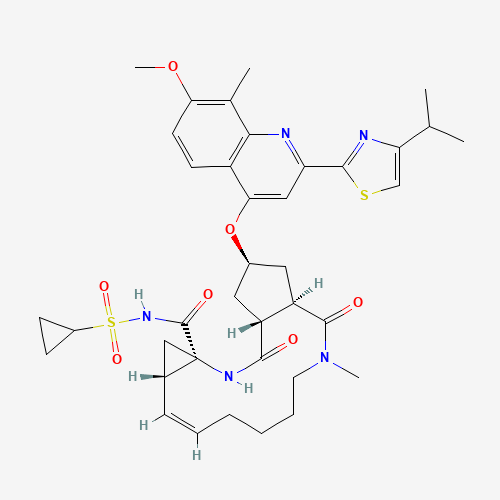| Pharmaceutical Information |
| Drug Name |
Simeprevir |
| Drug ID |
BADD_D02025 |
| Description |
Simeprevir is a hepatitis C virus (HCV) NS3/4A protease inhibitor indicated in patient's with HCV genotype 1 for the treatment of chronic hepatitis C virus (HCV) infection. HCV is a single-stranded RNA virus that is categorized into nine distinct genotypes, with genotype 1 being the most common in the United States, and affecting 72% of all chronic HCV patients [L852]. Like all NS3/4A inhibitors, simeprevir is a serine protease inhibitor in similarity to [DB08873] and [DB05521] but is classified as a second generation protease inhibitor. This class of antiviral drugs were the first direct acting antivirals approved but are associated with lower cure rates than newer drugs. Broad use of simeprevir occurred when it was used in combination with a newer drug, [DB08934]. Inhibiting HCV NS3/4A protease in a potent and highly specific manner, simeprevir is a direct-acting antiviral agent against the hepatitis C virus. Since the viral protease NS3/4A complex is essential for cleaving the HCV encoded polyprotein into individual viral proteins facilitating replication [A19632], the drug blocks the viral replication process. It is shown to display synergistic effects with interferon-α and HCV NS5B inhibitor, and additive effects with ribavirin in HCV replicon cells [A19629]. Unlike first generation serine protease inhibitors, simprevir has a sightly different resistance profile where limited therapeutic efficacy of the drug is observed with NS3 Q80K polymorphic variants and simeprevir-specific amino acid position of 168 also results in higher treatment failure rates [A19630]. The observed prevalence of the N3 Q80K polymorphism was 30% in subjects infected with HCV genotype 1a and 0.5% in subjects infected with HCV genotype 1b [A19630].
According to 2017 American Association for the Study of Liver Diseases (AASLD) and 2015 consensus guidelines from the Canadian Association for the Study of the Liver (CASL), simeprevir can be used as first-line or second-line threapies for treatment-naïve patients as adjunct to sofosbuvir treatment for genotype 1 or PEG-Interferon/ribavirin combination therapy for genotype 1 or 4. The combination therapy of simeprevir and other antiviral agents are initiated in HCV-positive patients with the intent to cure, or achieve a sustained virologic response (SVR), after 12 weeks of daily therapy. SVR and eradication of HCV infection is associated with significant long-term health benefits including reduced liver-related damage, improved quality of life, reduced incidence of Hepatocellular Carcinoma, and reduced all-cause mortality [A19626].
Simeprevir was approved by the FDA in November 2014 and is marketed under the brand name Olysio as oral tablets. Administered once daily with food, 150mg simeprevir capsule is used in combination with [DB08934] in patients with HCV genotype 1 without cirrhosis for 12 week duration. In patients with HCV genotype 1 with compensated cirrhosis, the treatment is directed for 24 week duration. Sustained virologic response 12 weeks after planned end of treatment (SVR12) was achieved in 170/176 (97%) subjects without cirrhosis treated with 12 weeks simeprevir in combination with sofosbuvir (FDA Label). The overall SVR12 was 88% (44/50) in treatment-naïve patients with cirrhosis [L852].
Simeprevir is also used in treatment of HCV genotype 4 patients with or without cirrhosis and is taken with [DB00008] and [DB00811]; this triple therapy allows shortening treatment duration from 48 weeks or longer to 12 or 24 weeks [A19630] depending on prior response status and presence of HIV-1 co-infection. Prior to initiation of treatment with [DB00008] and [DB00811], screening for the presence of virus with the NS3 Q80K polymorphism is strongly recommended and if detected, alternative treatment should be considered instead to prevent therapeutic failure. The SVR12 was 83% (29/35) in treatment-naïve patients and 86% (19/22) in relapsing patients. |
| Indications and Usage |
Indicated for the treatment of adults with chronic hepatitis C virus (HCV) infection: typically in combination with sofosbuvir in patients with HCV genotype 1 without cirrhosis or with compensated cirrhosis and in combination with peginterferon alfa (Peg-IFN-alfa) and ribavirin (RBV) in patients with HCV genotype 1 or 4 without cirrhosis or with compensated cirrhosis.
Resistance: Reduced susceptibility to simeprevir was most commonly associated with the viral NS3 Q80K polymorphism. Amino acid substitutions at NS3 positions S122, R155 and/or D168 are also shown to reduce susceptibility to simeprevir in genotype 1a/b patients.
|
| Marketing Status |
approved |
| ATC Code |
J05AP05 |
| DrugBank ID |
DB06290
|
| KEGG ID |
D10081
|
| MeSH ID |
D000069616
|
| PubChem ID |
24873435
|
| TTD Drug ID |
D00TLP
|
| NDC Product Code |
Not Available |
| UNII |
9WS5RD66HZ
|
| Synonyms |
Simeprevir | N-(17-(2-(4-isopropylthiazole-2-yl)-7-methoxy-8-methylquinolin-4-yloxy)-13-methyl-2,14-dioxo-3,13-diazatricyclo(13.3.0.04,6)octadec-7-ene-4-carbonyl)(cyclopropyl)sulfonamide | TMC 435350 | 435350, TMC | TMC435350 | TMC-435350 | TMC 435 | 435, TMC | TMC435 | TMC-435 | Olysio |
|
| Chemical Information |
| Molecular Formula |
C38H47N5O7S2 |
| CAS Registry Number |
923604-59-5 |
| SMILES |
CC1=C(C=CC2=C1N=C(C=C2OC3CC4C(C3)C(=O)N(CCCCC=CC5CC5(NC4=O)C(=O)NS(=O)(=O)C6CC6)
C)C7=NC(=CS7)C(C)C)OC |
| Chemical Structure |

|
|
| ADRs Induced by Drug |
|
|
*The priority for ADR severity classification is based on FAERS assessment, followed by the most severe level in CTCAE rating. If neither is available, it will be displayed as 'Not available'.
**The 'Not Available' level is hidden by default and can be restored by clicking on the legend twice.
|
|
|

